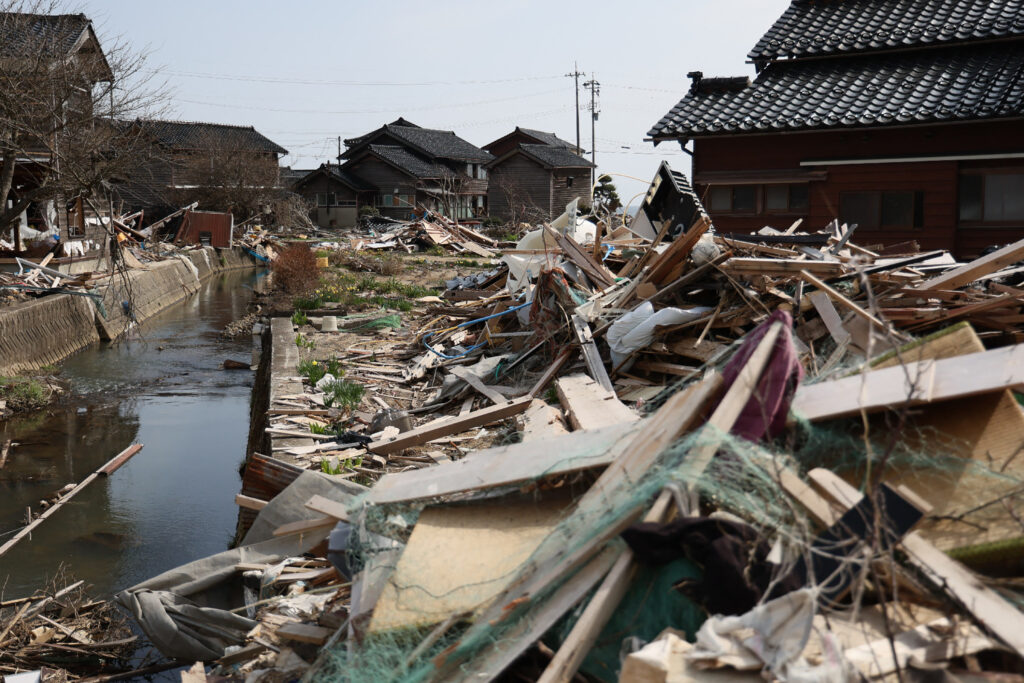
- ARAB NEWS
- 09 Jul 2025

WAJIMA: While Wednesday marks four months since a massive earthquake struck the Noto Peninsula in central Japan on New Year’s Day, local residents are facing a tough decision: whether to leave or remain in the quake-hit areas.
In the affected areas, efforts to restore water supplies and build temporary housing have been made hurriedly, but many damaged houses are being left as they are.
Mitsunobu Inoike, 68, head of the Kanakura district of Wajima, Ishikawa Prefecture, which is known for its terraced rice fields, is worried that his community could “fall apart.”
The district had 53 households before the Jan. 1 earthquake, but the number has halved over the past four months as residents fled after the quake. Some residents have given up on returning to the neighborhood because of their advanced age.
The homes of many remaining residents, including Inoike, were severely damaged in the quake, but they continue to live by working together to repair toilets, baths and other facilities. Since Jan. 4, they have been meeting at 8:30 a.m. every day to share information.
In the riverless district, the management of a reservoir is crucial for farming rice, which is basically the only crop grown there, and through this, the residents have developed their strong bonds. “We live in a harsh environment where we can’t do anything unless we work together,” Inoike said.
Temporary housing to be completed in late May about 6 kilometers from the district is the latest issue to concern Kanakura residents. They asked the Wajima city government to build such housing within the district, but the request was not accepted.
It is believed to be difficult for residents living in the temporary housing to meet face-to-face on a daily basis with those who remain in the district. “If we can’t meet, our community will fade away soon,” Inoike said.
In the hope that the evacuees will one day return to the district, the remaining residents are planning to send them a newsletter four times a year about the current situation in the community.
Many of the Kanakura people who took care of Inoike during his childhood are now in their 80s and 90s. “It pains me to think that they will not be able to spend their last days here,” he said.
Some people have made the tough decision to leave their hometown.
A man in his 70s and his wife bid farewell to the Monzen area of Wajima and moved in with their daughter’s family in the city of Namerikawa in neighboring Toyama Prefecture.
He was persuaded by the daughter, who was concerned about the parents’ safety, to make the decision. While his house escaped collapsing in the Jan. 1 earthquake, a nearby resident was trapped under a collapsed house and died.
He was born and raised in the Noto region. Residents in his neighborhood had such strong ties that they shared food and other supplies immediately after the disaster. He and his friends promised to rebuild the area to make it a livable place again.
However, the condition of his house, which had already experienced a strong quake that registered upper 6, the second-highest level on the Japanese seismic intensity scale, in 2007, has continued to deteriorate. A string of aftershocks following the Jan. 1 quake left him worried that his house might collapse at any moment.
For many days after the quake, he slept without changing into his pajamas so that he could flee immediately. Since he no longer felt safe living in his home, he decided to leave there.
He now feels guilty, accusing himself of being a “traitor” for leaving his hometown. “We had talked about joining hands to rebuild (the Monzen area), so I broke that promise,” he said.
Since moving to Namerikawa, he still comes to Wajima twice a month to meet with his friends and other residents. But he said, “Now that I decided to relocate (to Namerikawa), I can’t juggle my life (in Namerikawa and Wajima),” he said. “I need to move on.”
JIJI Press